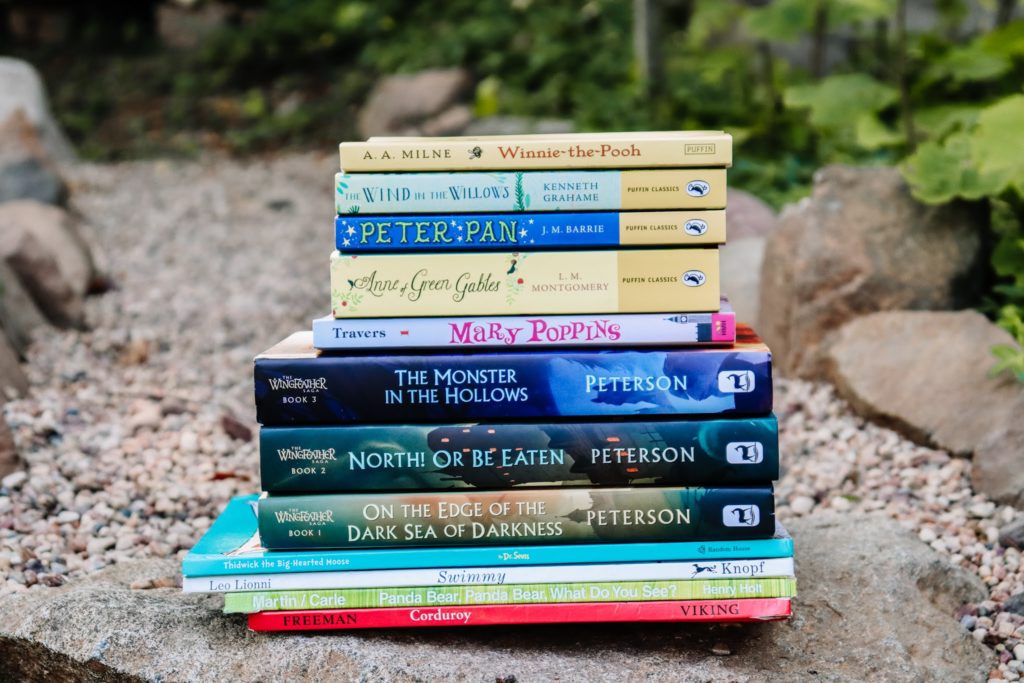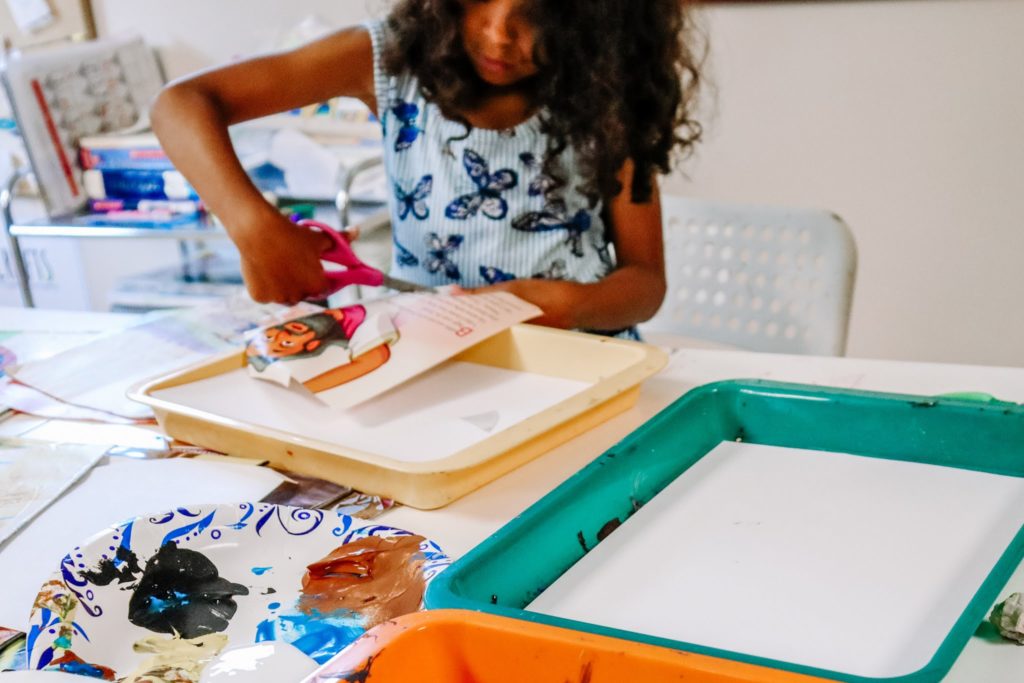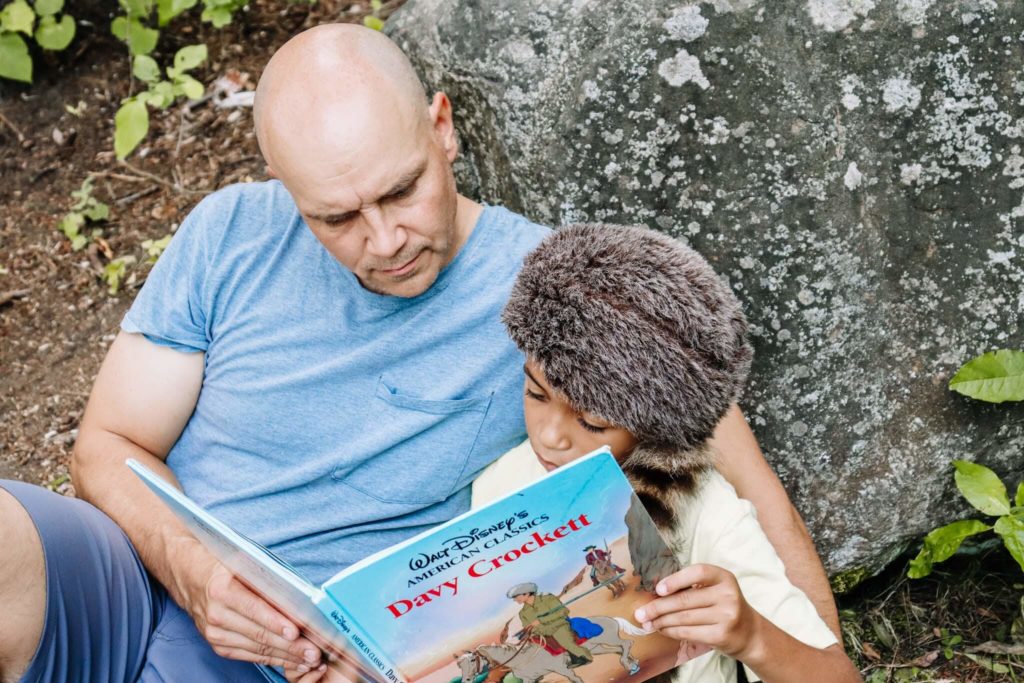With a little effort and and diligence you can motivate your kids to read and actually enjoy reading! Here are a few practical ways to

Cultivate. I love this word. It’s meaning can go many directions but always carries with it the need for responsibility and diligence, two character qualities that do not come natural to most people. An avid gardener and successful farmer would know all about cultivating, as they have to constantly tend to young shoots, crops, and animals. They have to plan, plant, tend, defend, and watch. Success is completely dependent upon their initiative, willingness, and effort.
Want to raise a voracious reader? Think of yourself as a farmer or a gardener, and think of your child’s mind as moist soil full of healthy seed. Then start the arduous (yet fulfilling!) task of cultivating. Tend to their minds with all diligence and be intentional, if you work hard your harvest will be great indeed.
Every family has a culture, one which usually stems from the habits and interests of the parents. When reading is prioritized and intentionally embedded within the habits of the family, an avid reader emerges over time. Here are 11 things that can help make reading a part of your family culture and thereby cultivate a love for it:
Read Aloud

When you sit behind a book with your child next to you, you both get to let your guards down, and you become friends sharing a lovely experience together. Together you explore new words, characters in all their complexities, storylines that elicit emotion and reaction, and places and things that lie beyond your home boundaries. It’s all shared and mutually enjoyed. It is a time of togetherness and closeness. You as the reader get to explore using different accents and dialects to make the read aloud interesting. And you get to be the one to make your children giggle as well as answer their questions.
Children begin to pick up on book-specific elements based on the cadence and intonation of your voice. In day to day conversation we dont usually say “once upon a time” or “she replied” when we are speaking to one another. These are book-specific elements of language. It will help your child’s future writing endeavors to understand that we write differently than we speak.
Reading becomes associated with love, togetherness, and mutual enjoyment. This is a sure way to cultivate a love for reading.
Read Good Books

Ah a good book, to what shall I compare it? A good book is like water on a hot day, an oreo during a sugar craving, sunshine on fresh snow after a long grey yesterday, a dewy warm spring morning that still smells like the fresh rain. A good book leaves an impression, it stays with you for a while, and produces a feeling of satisfaction. A bad book does the opposite, an awful, poorly written, pointless story can leave you drained and tired. Yes they do exist.
Not all reading is good reading, not all books are good books, not all authors and illustrators are created equal. High quality is key. Choose carefully, dear reader. Look for humor and personality, solid historical facts mingled with breathtaking prose, narrative that teaches and encourages, realism that is worth the reality check but don’t overdo it, and a little fantasy won’t kill you (C.S Lewis has proven this). We all have personal taste in illustration, youll naturally veer towards the ones that catch your eye but do not be afraid to try something different. Teach your children to appreciate an excellent artist. Look for authors who are not afraid of big words for young children, for these authors know not to disrespect a young mind by underestimating their intelligence and ability to discern the meaning of words based on context. Author Keith Graves was obviously aware of this fact as seen in his hilarious, laugh-out-loud picture book The Unexpectedly Bad Hair of Barcelona Smith:
“Barcelona Smith avoided playgrounds altogether. Swings were most untrustworthy contraptions. Who knew what injuries might occur on the slide?”
And again
“But on this day, the Smith hair went bananas. The strands uncoiled, the curls unkinked,the coif unstuck. Every follicle fooped”
Well done Mr. Graves.
Encourage Book Ownership

Libraries are special places to my family. It is by far one the best ideas someone has ever come up with, allowing access to books for free to community members. Get the max amount of library cards for your family and keep those cards maxed out.
But what about creating your own library? In the same way that buying a house is better than renting for a lifetime, so also, buying your own books is better than only borrowing and keeping few, if any, books in your home (yes I sure did just draw that comparison). Want to raise a lifelong reader? Encourage them to be book owners. Buy their favorite books for them! As a reward you can take them on a trip to Barnes and Noble or Half Priced books (or an online trip to Amazon.com or Bookshop) to get a new story they enjoyed. Be excited about watching your collection grow, they’ll get excited too.
Read Daily
Read Everyday. Make it a habit. Let it be a normal activity for your family to read, as typical as drinking coffee or picking up toys or cleaning messes. You’ll have to be intentional in making this a daily habit. It’ll require that you say “no” to certain things; perhaps being ok with letting the laundry and dishes pile up a bit during the day or putting your afternoon plans aside whenever you hear your 5 year old ask “can you read this to me?”
It is easy to find ways to fit reading aloud into your schedule. Before bed (or naptime) is helpful because reading helps the body to relax and prepare for bed, or perhaps carving out a daily quiet time. Whatever you choose, do it everyday, and stay consistent.
Create

Creativity and literacy go together beautifully. When you take the time to create something after reading it enhances the reading experience. Try imitating the illustrator’s pictures or style. Extend the story by adding to it in the form of your own story with illustrations included. Perhaps you are reading about John James Audubon in The Boy Who Drew Birds, you could encourage your children to draw birds as he did, or perhaps Kadir Nelson might motivate them to write their own picture book biography. It is not something that needs to happen after every reading, but encourage creativity in your children based on the books that they read. The books will often provide the ideas, and you’d be surprised at the creativity brimming in those little minds.
Create Reading Challenges
A reading challenge is an excellent way to get your children experiencing the joys of reading. The challenge could be based on the reading level of the book, a time-based parameter (ex. summer reading challenge), a certain number of books to read, or the completion of a series. Pick some options and let them choose based on those options, don’t make the parameter impossible but make sure they can feel the stretch, it’s good for them. For children new to chapter books, they are more willing to challenge themselves if it’s a book you have read together as a family already.
We have done different challenges here and there as our children are slowly reading longer books. Currently, my 6 year old is reading through the entire Imagination Station: Adventures in Odyssey series, and when my son was that age he took the initiative to read through all of Arleta Richardson’s Grandma’s Attic books. I’ve also given “mini challenges”. When we were studying birds, the children were required to read through one bird book a day and then narrate to me the book they read. Their narration had to be so persuasive that it would make me want to read it. This not only ensured they were reading, but it was also a fun way to hear about what they learned.
Don’t hesitate to challenge them, as this becomes a habit you’ll find that they are eager for more.
Explore Different Genres
There’s picture books, chapter books, non-fiction, fiction, classic, poetry, riddles, tongue twisters, magazines, etc. The list goes on. Encourage readings from a wide selection, don’t get caught up in age/reading levels, if they are interested enough they’ll figure it out. When my son was 6 he went through a stage where he became obsessed with tigers. He would read or listen to anything that mentioned tigers just so he could learn all he could. If he didn’t understand a word he simply asked, and then he naturally narrated what he read to the entire family. Because of his fascination, our family knows all about tigers, and we all alike stand in awe of that magnificent creature.
Read a variety of literature, do not feel confined to any one thing.
Create a Nook

Almost as important as the book is the place where the stories are enjoyed. Be intentional, make “special spots” around your home and yard for quick escapes to enjoy some reading. We have tried different nooks over the years, some as simple as a corners with an oversize pillow and a book basket nearby; others more complex with a tent hanging from the ceiling and pillows propped up on the floor. Currently, we are turning what was a second kitchen into our family library room. Outside, on those perfect weather days a simple blanket gets the job done, but benches tucked away in a garden or low hanging trees are always a treat. Get creative, make it special. Be sure its a place your young readers will yearn to return to day after day to enjoy their stories.
Form a Community
Anytime there is a community that shares a mutual interest, there will be a lot of gain. This goes for any subject or skill. That is why people do things in groups: classical conversations, math groups, Jane Austen book clubs, etc. A person with enough motivation can make great progress alone, but a community helps to foster where motivation is lacking, or make a motivated learner sharper.
With books it is no different. Read with friends! You don’t need a study guide to go through or anything fancy, just read the same book at the same time, then get together and share what you’ve read or created based on the reading. It enriches the experience and deepens friendship. Your children will have an opportunity to hear the opinions of friends who are reading the same books, and form better critical thinking skills as they hear different perspectives.
Be an Avid Reader Yourself

Your children are watching you. If you want to raise a reader you must be a reader yourself. When you fill up your book basket, be sure there are books in there for you too. Let them see the joy you have in reading, and share your books with them as well.
I enjoy a good novel, in fact they can be so hard to put down I have to carefully discipline myself when I decide to sample one. But I have also found that I enjoy reading the same books that I pick out for my children as well. I have learned so much from nonfiction picture books and biographies, and I delight to hand one of these to my children and savor the looks on their faces when I say “you’ve got to read this one, youll love it”. Read yourself, but not only your own books, theirs too…make it a family thing.
Dad’s involvement is an understatement, there is no greater earthly gift than an in-tune dad. I am so very thankful for my husband, he is committed to reading to our children each night, and devotionally at the dinner table. He also never hesitates to read aloud when they ask him (he puts on quite a show), and always has his own stack of books he is working through. Want voracious readers? Make sure mom and dad are avid readers, the kids will do what they see their parents doing.

Don’t Force Boring Stories
I’ll never forget reading a cute little picture book about a penguin to my 4 year old (I won’t give the title because you might like it). I was dying. The story was so unbelievably boring, and it seemed like it would never end. I was even beginning to fall asleep, but I kept the pep in my voice and tried to make things exciting. I could not wait for the story to be over, just as I was wondering how it was that this author has written so many books, my 4 year old slammed the book shut. She was bored too! That book has not been read again.
That is not the first time we stopped in the middle or even towards the beginning of a story. If we aren’t feeling it, we just stop. Maybe revisit it later or just be ok with the fact it is not for us. Don’t force a boring story, they know when you’re not interested, and they probably aren’t interested either.
Remember, the goal is to cultivate. Daily diligence, intentionality, and consistency is key, the harvest will come over time not overnight.
Need help filling up your book basket? Check out book reviews to get some ideas.
Happy Reading!
Leave a Reply